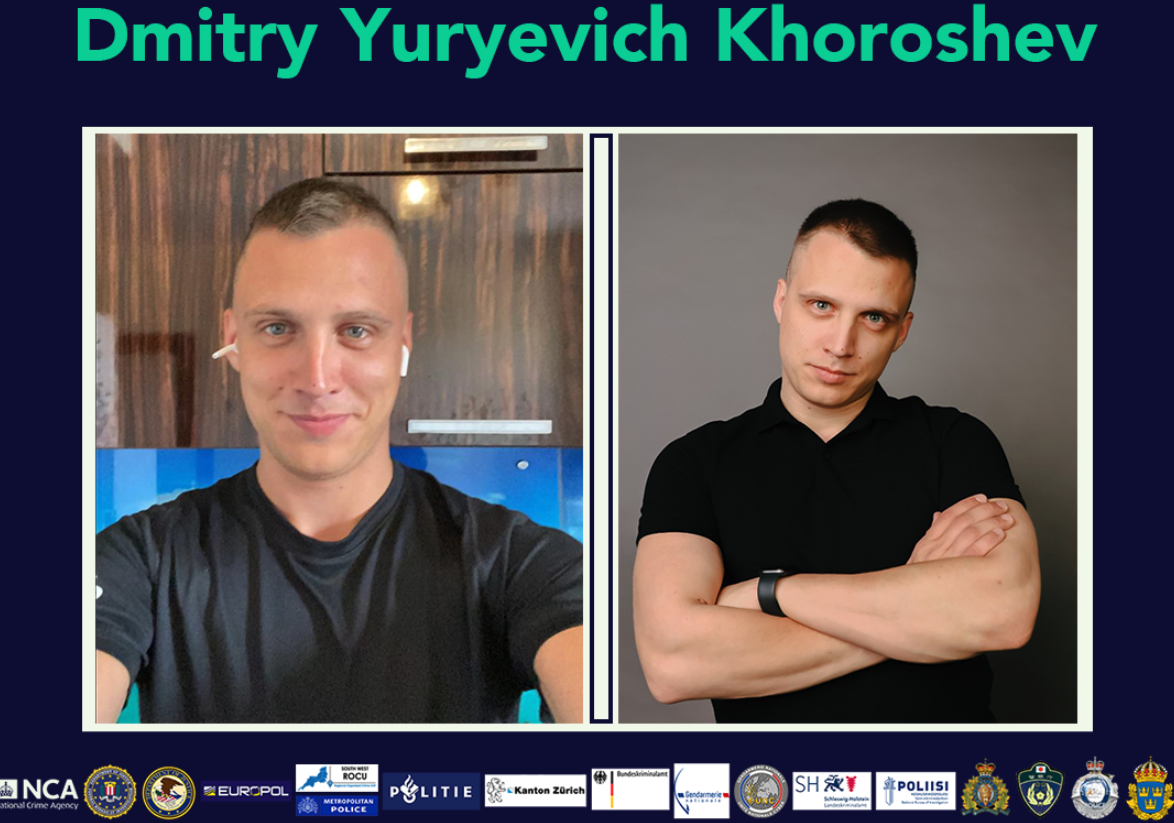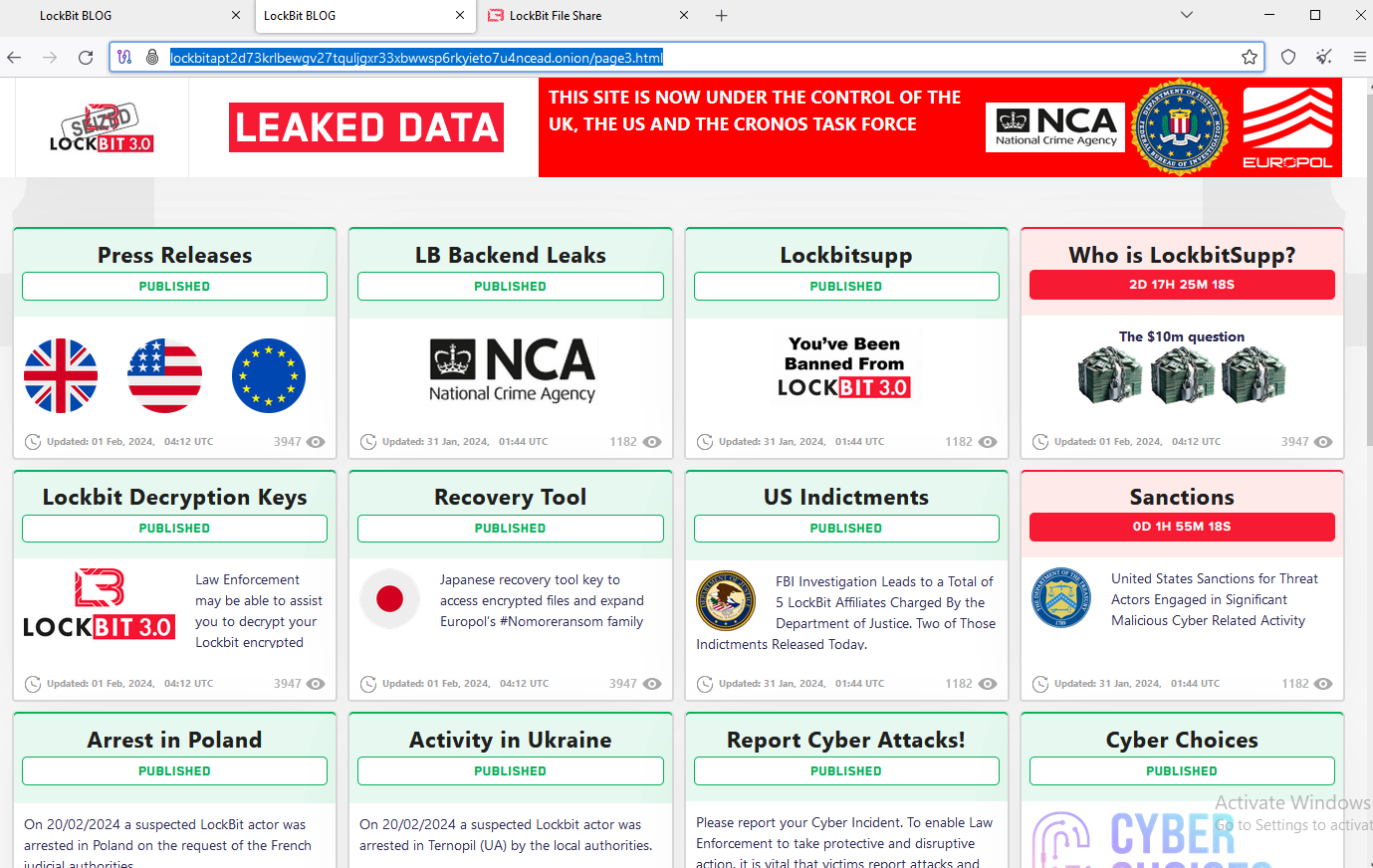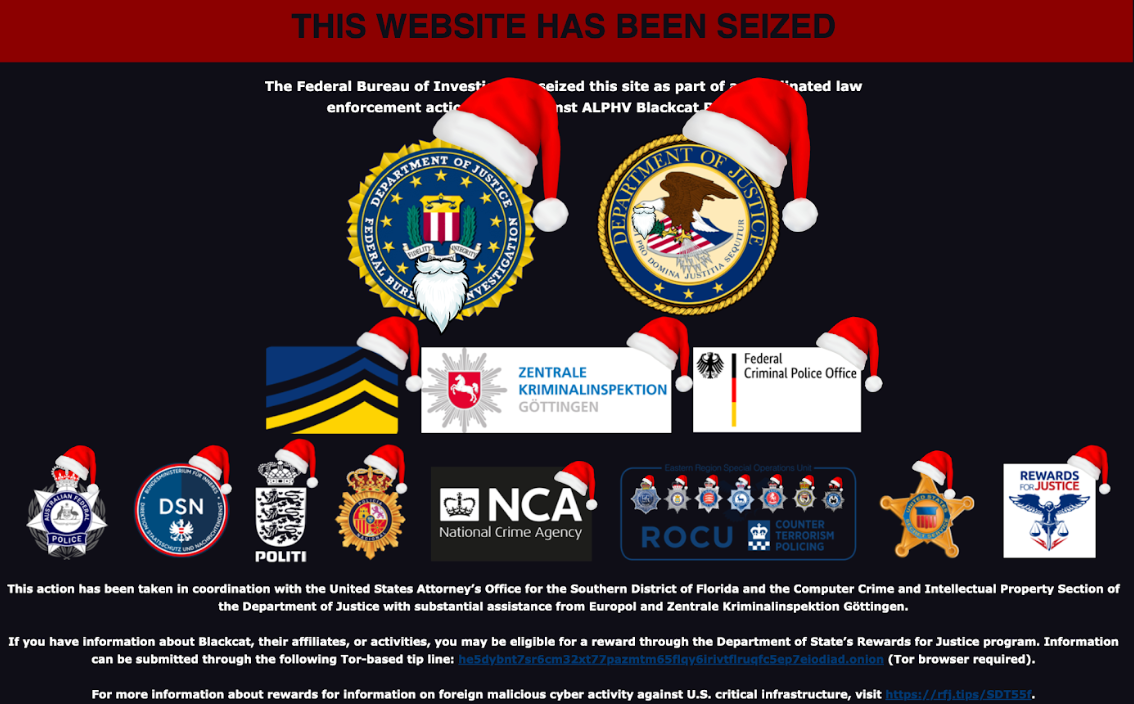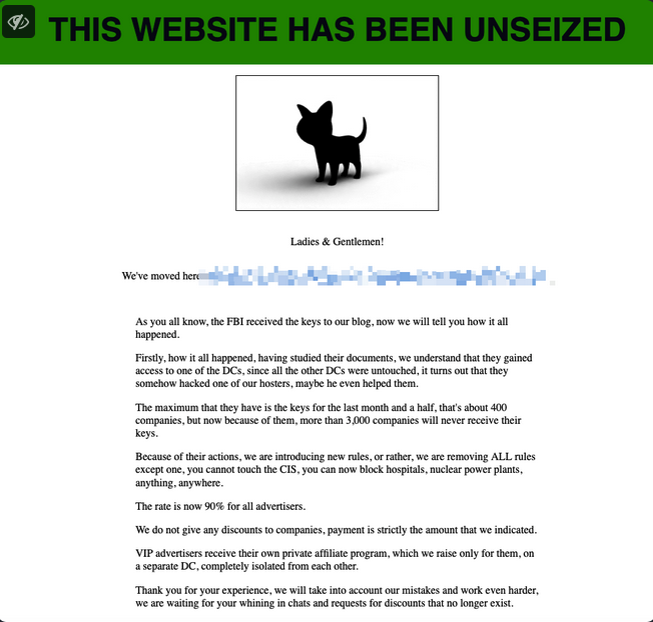The United States joined the United Kingdom and Australia today in sanctioning 31-year-old Russian national Dmitry Yuryevich Khoroshev as the alleged leader of the infamous ransomware group LockBit. The U.S. Department of Justice also indicted Khoroshev and charged him with using Lockbit to attack more than 2,000 victims and extort at least $100 million in ransomware payments.

Image: U.K. National Crime Agency.
Khoroshev (Дмитрий Юрьевич Хорошев), a resident of Voronezh, Russia, was charged in a 26-count indictment by a grand jury in New Jersey.
“Dmitry Khoroshev conceived, developed, and administered Lockbit, the most prolific ransomware variant and group in the world, enabling himself and his affiliates to wreak havoc and cause billions of dollars in damage to thousands of victims around the globe,” U.S. Attorney Philip R. Sellinger said in a statement released by the Justice Department.
The indictment alleges Khoroshev acted as the LockBit ransomware group’s developer and administrator from its inception in September 2019 through May 2024, and that he typically received a 20 percent share of each ransom payment extorted from LockBit victims.
The government says LockBit victims included individuals, small businesses, multinational corporations, hospitals, schools, nonprofit organizations, critical infrastructure, and government and law-enforcement agencies.
“Khoroshev and his co-conspirators extracted at least $500 million in ransom payments from their victims and caused billions of dollars in broader losses, such as lost revenue, incident response, and recovery,” the DOJ said. “The LockBit ransomware group attacked more than 2,500 victims in at least 120 countries, including 1,800 victims in the United States.”
The unmasking of LockBitSupp comes nearly three months after U.S. and U.K. authorities seized the darknet websites run by LockBit, retrofitting it with press releases about the law enforcement action and free tools to help LockBit victims decrypt infected systems.

The feds used the existing design on LockBit’s victim shaming website to feature press releases and free decryption tools.
One of the blog captions that authorities left on the seized site was a teaser page that read, “Who is LockbitSupp?,” which promised to reveal the true identity of the ransomware group leader. That item featured a countdown clock until the big reveal, but when the site’s timer expired no such details were offered.
Following the FBI’s raid, LockBitSupp took to Russian cybercrime forums to assure his partners and affiliates that the ransomware operation was still fully operational. LockBitSupp also raised another set of darknet websites that soon promised to release data stolen from a number of LockBit victims ransomed prior to the FBI raid.
One of the victims LockBitSupp continued extorting was Fulton County, Ga. Following the FBI raid, LockbitSupp vowed to release sensitive documents stolen from the county court system unless paid a ransom demand before LockBit’s countdown timer expired. But when Fulton County officials refused to pay and the timer expired, no stolen records were ever published. Experts said it was likely the FBI had in fact seized all of LockBit’s stolen data.
LockBitSupp also bragged that their real identity would never be revealed, and at one point offered to pay $10 million to anyone who could discover their real name.
KrebsOnSecurity has been in intermittent contact with LockBitSupp for several months over the course of reporting on different LockBit victims. Reached at the same ToX instant messenger identity that the ransomware group leader has promoted on Russian cybercrime forums, LockBitSupp claimed the authorities named the wrong guy.
“It’s not me,” LockBitSupp replied in Russian. “I don’t understand how the FBI was able to connect me with this poor guy. Where is the logical chain that it is me? Don’t you feel sorry for a random innocent person?”
LockBitSupp, who now has a $10 million bounty for his arrest from the U.S. Department of State, has been known to be flexible with the truth. The Lockbit group routinely practiced “double extortion” against its victims — requiring one ransom payment for a key to unlock hijacked systems, and a separate payment in exchange for a promise to delete data stolen from its victims.
But Justice Department officials say LockBit never deleted its victim data, regardless of whether those organizations paid a ransom to keep the information from being published on LockBit’s victim shaming website.
Khoroshev is the sixth person officially indicted as active members of LockBit. The government says Russian national Artur Sungatov used LockBit ransomware against victims in manufacturing, logistics, insurance and other companies throughout the United States.
Ivan Gennadievich Kondratyev, a.k.a. “Bassterlord,” allegedly deployed LockBit against targets in the United States, Singapore, Taiwan, and Lebanon. Kondratyev is also charged (PDF) with three criminal counts arising from his alleged use of the Sodinokibi (aka “REvil“) ransomware variant to encrypt data, exfiltrate victim information, and extort a ransom payment from a corporate victim based in Alameda County, California.
In May 2023, U.S. authorities unsealed indictments against two alleged LockBit affiliates, Mikhail “Wazawaka” Matveev and Mikhail Vasiliev. In January 2022, KrebsOnSecurity published Who is the Network Access Broker ‘Wazawaka,’ which followed clues from Wazawaka’s many pseudonyms and contact details on the Russian-language cybercrime forums back to a 31-year-old Mikhail Matveev from Abaza, RU.
Matveev remains at large, presumably still in Russia. Meanwhile, the U.S. Department of State has a standing $10 million reward offer for information leading to Matveev’s arrest.
Vasiliev, 35, of Bradford, Ontario, Canada, is in custody in Canada awaiting extradition to the United States (the complaint against Vasiliev is at this PDF).
In June 2023, Russian national Ruslan Magomedovich Astamirov was charged in New Jersey for his participation in the LockBit conspiracy, including the deployment of LockBit against victims in Florida, Japan, France, and Kenya. Astamirov is currently in custody in the United States awaiting trial.
The Justice Department is urging victims targeted by LockBit to contact the FBI at https://lockbitvictims.ic3.gov/ to file an official complaint, and to determine whether affected systems can be successfully decrypted.
The U.S. Federal Bureau of Investigation (FBI) disclosed today that it infiltrated the world’s second most prolific ransomware gang, a Russia-based criminal group known as ALPHV and BlackCat. The FBI said it seized the gang’s darknet website, and released a decryption tool that hundreds of victim companies can use to recover systems. Meanwhile, BlackCat responded by briefly “unseizing” its darknet site with a message promising 90 percent commissions for affiliates who continue to work with the crime group, and open season on everything from hospitals to nuclear power plants.

A slightly modified version of the FBI seizure notice on the BlackCat darknet site (Santa caps added).
Whispers of a possible law enforcement action against BlackCat came in the first week of December, after the ransomware group’s darknet site went offline and remained unavailable for roughly five days. BlackCat eventually managed to bring its site back online, blaming the outage on equipment malfunctions.
But earlier today, the BlackCat website was replaced with an FBI seizure notice, while federal prosecutors in Florida released a search warrant explaining how FBI agents were able to gain access to and disrupt the group’s operations.
A statement on the operation from the U.S. Department of Justice says the FBI developed a decryption tool that allowed agency field offices and partners globally to offer more than 500 affected victims the ability to restore their systems.
“With a decryption tool provided by the FBI to hundreds of ransomware victims worldwide, businesses and schools were able to reopen, and health care and emergency services were able to come back online,” Deputy Attorney General Lisa O. Monaco said. “We will continue to prioritize disruptions and place victims at the center of our strategy to dismantle the ecosystem fueling cybercrime.”
The DOJ reports that since BlackCat’s formation roughly 18 months ago, the crime group has targeted the computer networks of more than 1,000 victim organizations. BlackCat attacks usually involve encryption and theft of data; if victims refuse to pay a ransom, the attackers typically publish the stolen data on a BlackCat-linked darknet site.
BlackCat formed by recruiting operators from several competing or disbanded ransomware organizations — including REvil, BlackMatter and DarkSide. The latter group was responsible for the Colonial Pipeline attack in May 2021 that caused nationwide fuel shortages and price spikes.
Like many other ransomware operations, BlackCat operates under the “ransomware-as-a-service” model, where teams of developers maintain and update the ransomware code, as well as all of its supporting infrastructure. Affiliates are incentivized to attack high-value targets because they generally reap 60-80 percent of any payouts, with the remainder going to the crooks running the ransomware operation.
BlackCat was able to briefly regain control over their darknet server today. Not long after the FBI’s seizure notice went live the homepage was “unseized” and retrofitted with a statement about the incident from the ransomware group’s perspective.

The message that was briefly on the homepage of the BlackCat ransomware group this morning. Image: @GossiTheDog.
BlackCat claimed that the FBI’s operation only touched a portion of its operations, and that as a result of the FBI’s actions an additional 3,000 victims will no longer have the option of receiving decryption keys. The group also said it was formally removing any restrictions or discouragement against targeting hospitals or other critical infrastructure.
“Because of their actions, we are introducing new rules, or rather, we are removing ALL rules except one, you cannot touch the CIS [a common restriction against attacking organizations in Russia or the Commonwealth of Independent States]. You can now block hospitals, nuclear power plants, anything, anywhere.”
The crime group also said it was setting affiliate commissions at 90 percent, presumably to attract interest from potential affiliates who might otherwise be spooked by the FBI’s recent infiltration. BlackCat also promised that all “advertisers” under this new scheme would manage their affiliate accounts from data centers that are completely isolated from each other.
BlackCat’s darknet site currently displays the FBI seizure notice. But as BleepingComputer founder Lawrence Abrams explained on Mastodon, both the FBI and BlackCat have the private keys associated with the Tor hidden service URL for BlackCat’s victim shaming and data leak site.
“Whoever is the latest to publish the hidden service on Tor (in this case the BlackCat data leak site), will resume control over the URL,” Abrams said. “Expect to see this type of back and forth over the next couple of days.”
The DOJ says anyone with information about BlackCat affiliates or their activities may be eligible for up to a $10 million reward through the State Department’s “Rewards for Justice” program, which accepts submissions through a Tor-based tip line (visiting the site is only possible using the Tor browser).
Further reading: CISA StopRansomware Alert on the tools, techniques and procedures used by ALPHV/BlackCat.